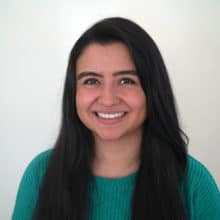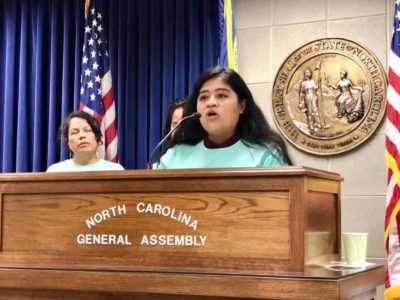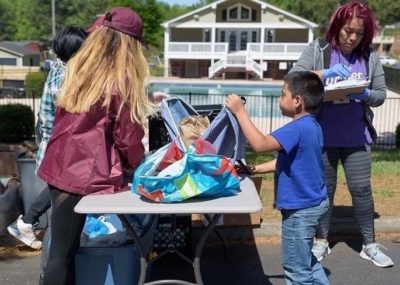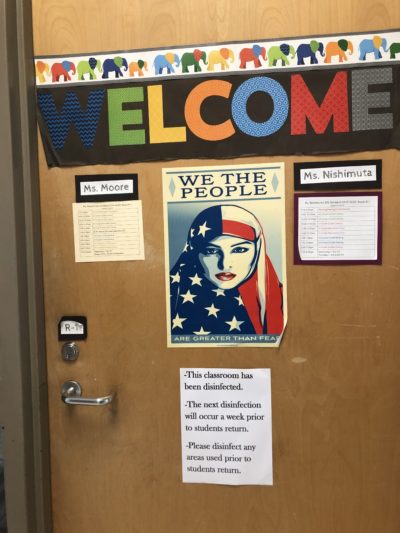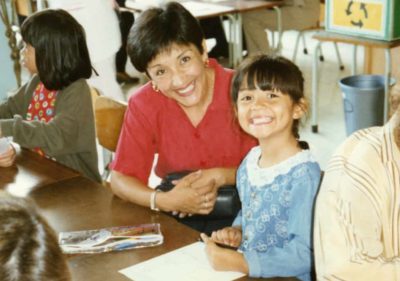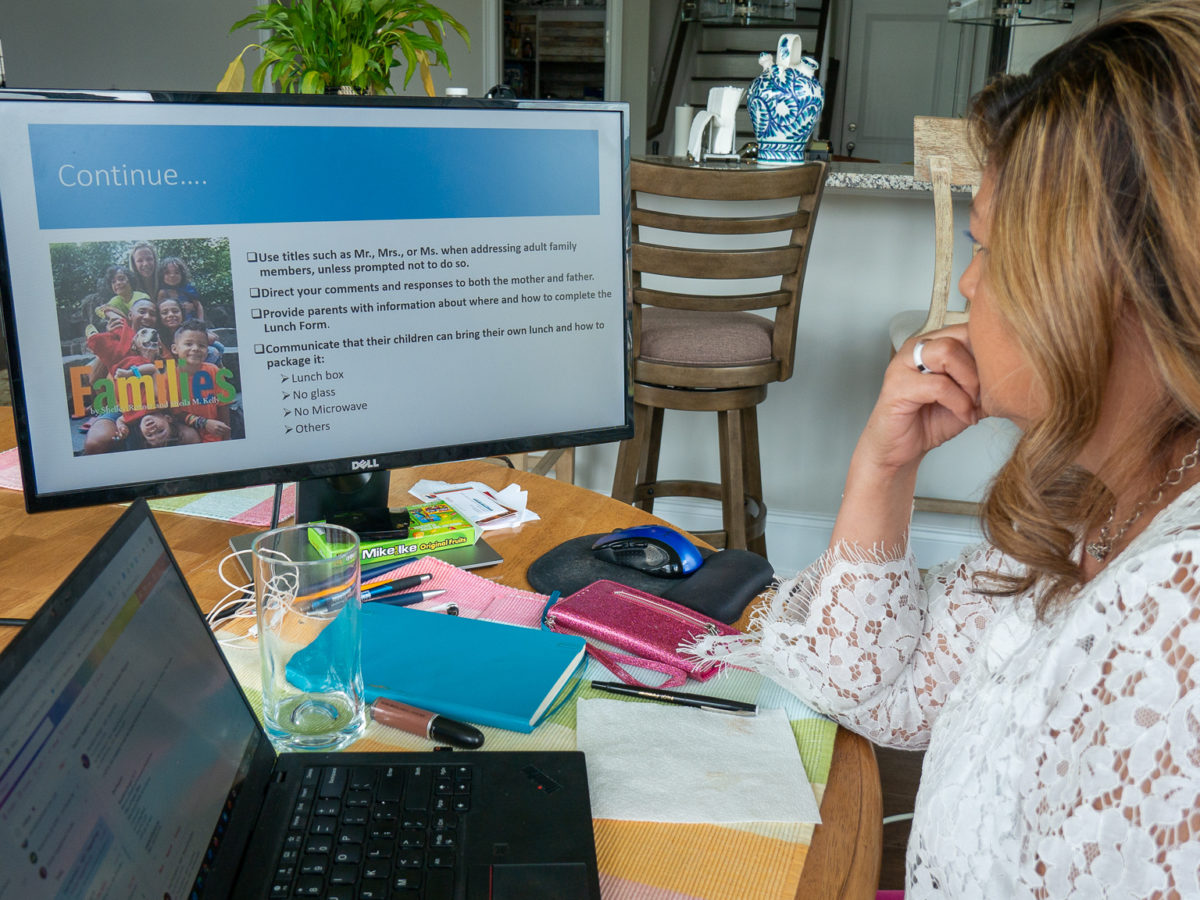

Haz clic aquí para leer este artículo en español.
MariaRosa Rangel set herself up at the end of the dining room table to begin her work day. She typed away as she looked at both screens in front of her. Several email notifications sounded off as she kept working.
In her first hour that morning, she met with a school to schedule family engagement workshops, discussed the number of flyers to print offering a breakdown of workshops for the school year in English and Spanish, connected a family in need with a church, signed up for a volunteer opportunity at Wake County to distribute devices, and discussed the schedule for this school year’s workshops with a coworker.
And this is one of her lighter days. To keep her energy level up, she had a box of candy on standby. “Those are my husband’s,” she said. “I took them from him. He saw them here this morning and said, ‘You took my candy!’ But I found them,” she explained with a smile.
From family involvement to family engagement
Rangel is the Director for Family and Community Engagement in the Office of Equity Affairs in the Wake County Public Schools System (WCPSS). As part of her job, she leads Family Academy, a family engagement program that provides families with the necessary academic tools to support the success of their child’s education. It also brings schools, parents and guardians, families, and community organizations together as equal partners.
Rangel has led Family Academy for 17 years. The program has gone through several changes during the years, including its name. “We used to call them parent workshops, and they were just for Latinos,” she said.
One workshop in particular taught parents what to do and say during a parent-teacher conference. Rangel would role play with them:
“Cuando usted entre, salude a la maestra, diga algo positivo del salón. Si hay un intérprete, no se preocupe, la intérprete es su voz. Usted siga hablando pero no muy fuerte y rápido para que la intérprete pueda captar todo lo que usted dice.”
“When you come in, say hello to the teacher, say something positive about the room. If there is an interpreter, don’t worry, the interpreter is your voice. You just keep talking but not too loud and fast so that the interpreter can pick up on everything you say.”
Rangel told parents which words and phrases they could use to ensure their child would get the education they deserved:
“Estas son palabras que usted puede usar. Por ejemplo, si la maestra le dice, ‘Su hijo no está haciendo bien en matemática o en lectura,’ entonces usted le pregunta, ‘¿Qué intervenciones están haciendo ustedes para que mi hijo pueda leer?’”
“These are words that you can use. For example, if the teacher tells you, ‘Your child is not doing well in math or reading,’ then you will ask, ‘What interventions are you doing so my child can read?'”
“They didn’t even know what that meant,” Rangel said. “But when I told them what that meant, they felt empowered, you know? Like, ‘Yeah, I could use a sophisticated word.’”
After seeing how successful these workshops were for their Latinx families, WCPSS asked Rangel if she’d like to expand them and include all the LEP (Limited English Proficiency) and ESL (English as a Second Language) families in the district.
“We started doing them in different languages: Chinese, Korean, Arabic, Swahili, French,” she said. “That’s when it became Family Academy.”
For the past 17 years, Wake County has seen a steady increase of its Latinx and Asian student populations. Back in 2004, 7.24% of students were Latinx and 4.29% were Asian. This year, these percentages are 18.4% and 9.8%, respectively.
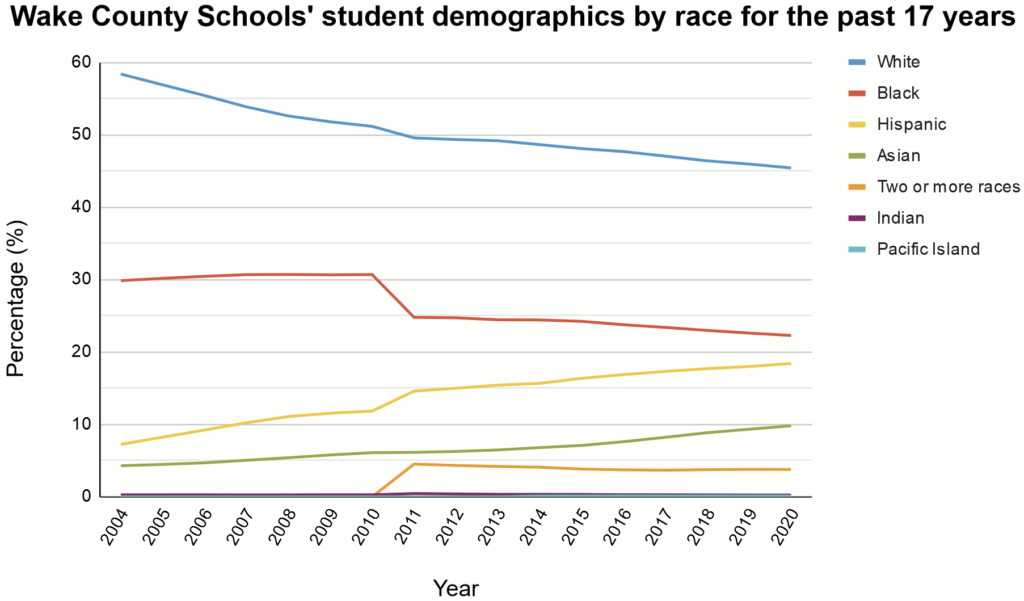

Note: The categories “Two or more races” and “Pacific Island” were added in school year 2010-2011.
Family Academy now includes workshops for school staff and administration on how to successfully engage with all their students’ families. The topics include: How to engage Latino families, How to understand the Latino culture, How to engage diverse families, Closing the gap, and Diversity and inclusion training.
Shifting to virtual engagement
Back in mid-March, when Gov. Roy Cooper issued an executive order that closed all public schools to limit the spread of COVID-19, school districts across the state had to deal with remote learning and all the logistical challenges that came with it. This included handing out devices and setting up hot spots to ensure students wouldn’t be cut off entirely from their education. But to buy this technology, WCPSS had to shift funding around and pull from other programs, like Family Academy.
Before the pandemic, Rangel worked with two part-time contractors: one who coordinated the different parent workshops and another who put together information packages.
After the pandemic hit, Rangel’s team was down to just herself.
She understood the district’s reasoning behind the budget cuts. “But I couldn’t stop and not do what I do,” she said. “When the funds were taken, it forced me to think outside the box, and I started to think about, ‘How can I engage my families? How can I get to my families?’”
Curious about our ESL community?
Tapping into the community
Rangel had an idea. On a trip to Mexico last year, she was taken aback by the way Facebook was ingrained in people’s lives. “Every person that I came across in Mexico, from urban to rural areas, had access to a smartphone and [was] also connected to Facebook.”
Family Academy already had a Facebook page, but it hadn’t been updated for a while. “Our Facebook page was dead,” said Rangel. So, she revived it.
Rangel had several presentations with information she wanted parents to know. She knew that the best way to interact with the families would be through videos, whether YouTube videos or Facebook Live. “We needed to find ways to provide parents with the tools and also create videos to educate them [about] the different platforms,” she said.
Since she didn’t have the funding to pay her contractors to help her, she reached out to an affinity group of Latinx educators in her district. “I said, ‘listen, I need your help. I need to provide parents with information about how to support their kids academically, but I need presenters,’” she said.
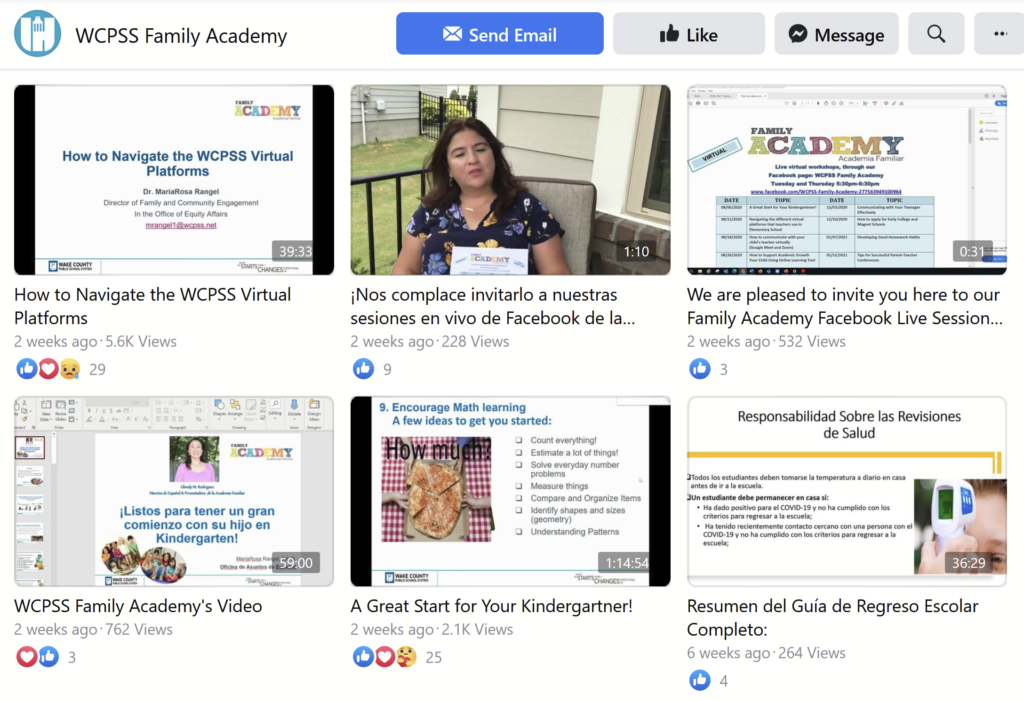

And her community came through. In the span of five months, educators from WCPSS Central Services Departments supported Rangel by creating 89 videos: 48 in Spanish and 41 in English. The topics with the biggest impact on parents were:
- How to Navigate the WCPSS Virtual Platforms
- A Great Start for Your Kindergartner!
- WCPSS Academic Online Resources
- Transitioning to Middle School
- Tips for Successful Parent-Teacher Conferences
“Congratulations for taking us into account”
Rangel was determined to get the videos published and available for her parents. She recalls one time when she worked nonstop on producing content until 5 a.m. She went to sleep and woke up at 9 a.m. to keep working.
Like everyone else, she was also dealing with her own life events during this process. Her son was a freshman in high school when schools closed in March, so she and her husband had to help him adjust to remote learning.
They also moved in the spring, which ended up being a months-long process. It wasn’t until recently that she and her family were able to take their belongings out of storage and settle into their new home.
Her efforts paid off. In the 2019-2020 school year, Family Academy had an attendance record of 9,539 people, nearly doubling the attendance from last year. Nearly half of these attendance numbers, 46%, came from the virtual parent workshops they hosted online.
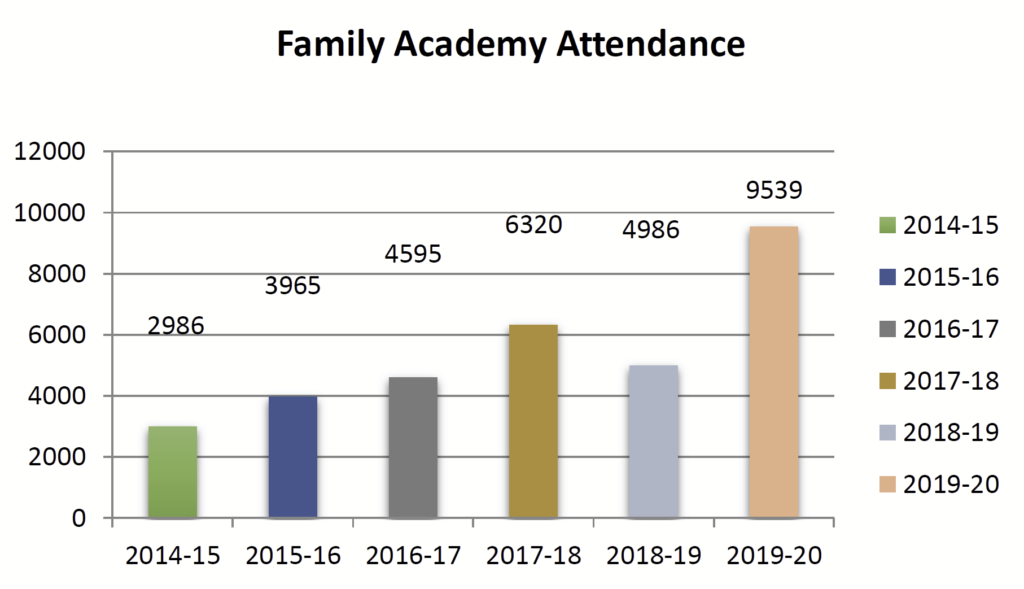

Rangel is certain she made the right choice by dusting off Family Academy’s Facebook page. “I think that made it easier for parents just to login from their phone and see and interact with Facebook Live. And we saw the increase of families viewing our Family Academy parent workshops and then sending us questions. So, I think that helped us to reach more families.”
The feedback she received proved how appreciative parents were that this content was not only available, but that they saw themselves reflected in the educators in the videos. “It really touched a lot of families because think about it — they could just open their phone, go into Facebook, and connect,” said Rangel.
These are some of the comments Rangel received from parents:
The Parent Trainers were very enthusiastic and really enjoyed how they presented the topics.
I understood everything because it was conducted in Spanish by a Latino person like me.
Congratulations for taking us into account and for the educational information to help [our] children with their academics.
I enjoyed learning new strategies to motivate my children to read, everything was excellent thanks.
I would like for the school to continue offering the Parent Workshops to better support our children with their academic work.
An uncharted back-to-school
Family Academy’s workshop lineup for this school year is already scheduled through May 2021. They will be offering 26 Facebook Live Parent Workshops in English, Spanish, and Arabic. Some of the topics include: Getting to know the U.S.A. educational system, Parent advocacy and engagement in your child’s education, and How to communicate with your child’s teacher virtually (Google Meet and Zoom).
To let families know about these workshops, they posted the English flyer on Facebook. In just two days, it reached more than 18,000 people and had garnered nearly 3,000 engagements from the community.
In addition to these 26 workshops, WCPSS schools have so far requested 103 one-on-one workshops with Family Academy. These workshops will be offered in English, Spanish, and Arabic. They are requested directly by schools for their staff, administration, and families. Unlike the Facebook Live workshops, these will be conducted either on Zoom or Google Meet. They span up until May of next year.
Three weeks ago, Family Academy’s Facebook page had around 980 likes. Now, they have nearly 1,800 likes. It’s clear Rangel pinpointed parents’ need for this information. Now, with the Facebook page as a guaranteed source, this virtual community is quickly emerging.
Thankfully, Family Academy has their funding back. “My girls are back,” said Rangel with a smile. “I’m so glad because I was burning [out]. There’s a lot of work behind planning workshops. It’s a lot of little details that people don’t see, right? And I was juggling that, I was juggling everything else, and I needed support. So I’m so glad that we have the funding moving forward to keep promoting and educating our families.”
“There’s not a dull moment in my life right now”
Rangel reflected on just how many things have changed in the past five months. “There was a way that we did business to get us ready for the school year, but this year really changed everything,” she said. “These five months have been a learning experience about navigating this new reality of doing business such as: How are we going to educate our students? How are we going to provide training for faculty and staff? How are we going to reach parents? How are we going to engage parents? How are we going to engage with the community?”
These questions fueled her to create countless hours of video content for her families on Facebook and motivated her to keep making sure that every single parent has the necessary resources to help with their child’s education.
Rangel also makes sure to connect directly with parents and determine what strategies work best for their children. These include creating schedules to provide children with an academic routine outside of their school environment.
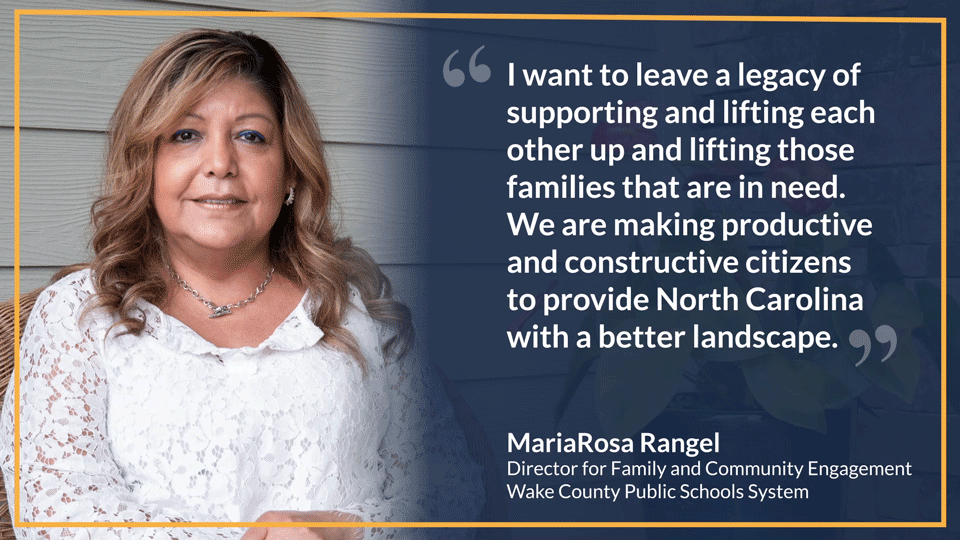

On top of her work with WCPSS, Rangel also plays key roles within 15 organizations across the state: North Carolina Society of Hispanic Professionals, Alianza Latina Pro-Educación en Salud (ALPES), Wake County PTA Council, North Carolina PTA, Red Global de Mexicanos, Adelante Education Coalition, Governor’s Advisory Council on Hispanic/Latino Affairs, Public School Forum of North Carolina, Consulate General of Mexico in Raleigh, N.C., Asociación de Mexicanos en Carolina del Norte (AMEXCAN), Hispanic/Latino/a Workforce and Education Action Coalition, Triangle Latino Resources Community, NCSU College of Education Board, Marbles Kids Museum, and Habitat for Humanity of Wake County.
Rangel feels that her involvement with all of these organizations will help tailor these services to her families’ needs.
“There’s not a dull moment in my life right now, you know? Creating videos, creating presentations, doing forums explaining to the families what’s happening, answering emails. It’s also going into my board meetings to make sure that I voice my opinion, that I advocate for programs.”
Even though this is grueling work, Rangel enjoys it as she keeps her eye on the bigger picture. “I think about … If I could help a family and make a family’s life better, why not? I think about a lot of immigrants and how they want the best for their kids. So, if I could change that family’s mindset of viewing education as a tool for success, think about what’s going to happen with that child’s life. It’s like a domino effect,” she said.
Rangel is very aware of the power that comes from having your school and community supporting you along the way. “I think about my own personal life and my mom and how she was able to change us because she got the support from the community,” she said. “Somebody told her, ‘You need to make sure that your kids go to school, that they have an education because that’s going to open so many doors for them.’”
Despite all the curveballs that COVID-19 has thrown her way, Rangel has tried to find the silver linings of this situation. “There has been a lot of good in this: spending more time with your family, enjoying the beauty of nature, going for walks, getting to know your neighbors. So it’s been interesting.”
